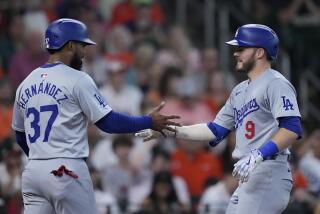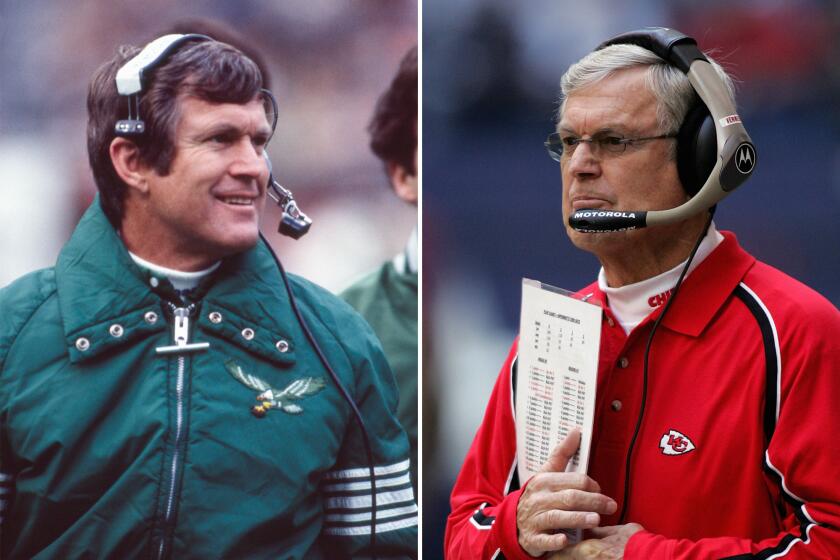Labor Talks Drag On
- Share via
NEW YORK — With the clock ticking ominously toward the union’s Friday strike date, negotiators for owners and players met late into the night Monday, looking for common ground on the pivotal issues of revenue sharing and payroll tax.
Neither side would comment on the specifics of their three sessions Monday, but sources said they were conducted against the backdrop of a militant group of owners urging negotiators and their fellow owners to hold firm in the belief, as a person familiar with the militants’ thinking put it, “that the players don’t really have the heart to strike.”
That person added: “The hawks are trying to stampede the process, but if they don’t think the players will go out, they’re making a serious mistake.”
Paul Lo Duca, the Dodger catcher and union representative, had expressed similar sentiments in a story that appeared in Monday’s editions of The Times, saying that management’s bargaining position was “getting to be a joke” and that some owners “think we’re bluffing [about shutting down Friday], but we’re not.”
To what extent the militants have the ear of Commissioner Bud Selig isn’t clear, but they are definitely an 11th-hour concern to the union, which would like to see Selig at the bargaining table.
Sources said the union is leery of making further concessions without assurances from Selig that owners will ratify a deal. Rob Manfred, management’s lead lawyer, has said that any agreement he reaches with the union will be approved by Selig, but the union is wary.
Selig would need only 16 of 30 owners to approve a new collective bargaining agreement, but it’s believed that the revenue sharing element would have to be voted on separately, requiring 22 votes, and the hawks might represent an obstacle if they believe the revenue-sharing plan does not transfer enough money from high-revenue to low-revenue clubs.
There are at least seven owners/club chairmen in the militant camp. They include San Diego’s John Moores, who has already expressed his willingness to sit out a season rather than approve a bad deal; Atlanta’s Stan Kasten; Kansas City’s David Glass; Minnesota’s Carl Pohlad; Houston’s Drayton MacLane; Texas’s Tom Hicks, and the Chicago White Sox’s Jerry Reinsdorf.
Asked if he would like to see Selig at the table, union leader Don Fehr said, “I suppose he would be here if it’s important to him.”
Meantime, Manfred addressed the looming deadline and said, “At some point, expressing to people that time is tight is sort of something that you don’t need to do. Everyone knows where we’re at right now.”
The negotiators have until about noon Friday to reach an agreement or that day’s games will not be played. It is believed the union will not delay its walkout even if the sides are close.
At Dodger Stadium on Monday, Lo Duca again stressed that the players are unified behind Fehr and willing to risk the public backlash to a strike rather than accepting a tax and revenue-sharing agreement that would be tantamount to a salary cap.
“I understand the public perception, but if you’ve ever heard [Fehr] talking to Bud Selig, it’s like a college graduate to a kindergartner,” said the suddenly outspoken Lo Duca, a full-fledged union man in his second full season. [Fehr is] not blindly leading us. He’s awesome. There’s no better person we’d like to have on our side.”
Management submitted a new proposal Sunday in which clubs would share 36% of local revenue, an increase from 20% this season. Owners had previously sought 37% revenue sharing and the union raised its figure to 33.3%.
Management’s plan would transfer $263 million from high-revenue to low-revenue clubs next season, based on 2001 figures.
The union proposal would eventually transfer $242.3 million--but only in the final year of the agreement. Its plan calls for transferring $172.3 million in 2003, $195.6 million in 2004, $219 million in 2005 and $242.3 million in 2006.
The payroll tax remains the biggest hurdle. Owners, determined to slow spending of high-revenue teams, are demanding the tax that the union, in conjunction with increased revenue sharing, views as a salary cap by another name.
Owners increased their threshold to $107 million in the first three years of the new contract and to $111 million in 2006. Based on projections, seven teams would be affected under those thresholds.
The union has proposed thresholds of $125 million next year, $135 million in 2004 and $145 million in 2005. Also at issue is the union’s opposition to a tax in the final season of the deal, and the tax rates.
Owners want teams to be taxed at 35% the first time they exceed the threshold, 40% the second time, 45% the third time and 50% the fourth time. Players have proposed rates of 15% to 40%.
*
Times staff writer Mike DiGiovanna contributed to this report.
More to Read
Go beyond the scoreboard
Get the latest on L.A.'s teams in the daily Sports Report newsletter.
You may occasionally receive promotional content from the Los Angeles Times.










